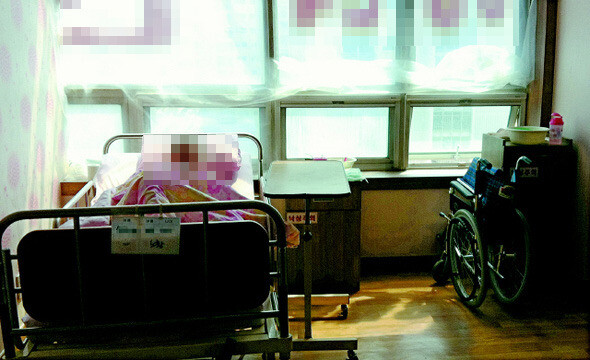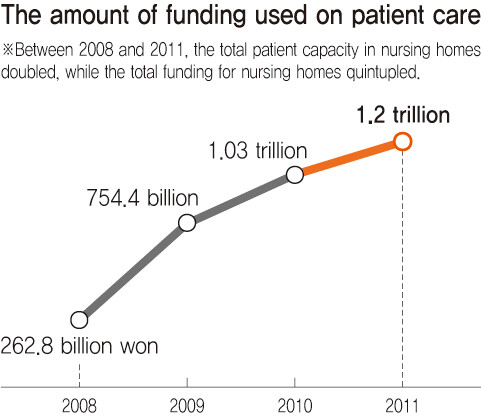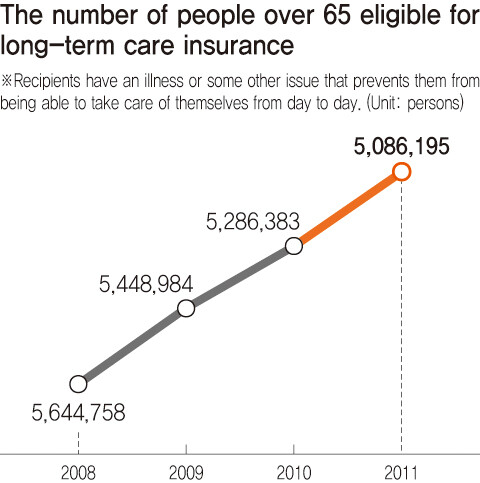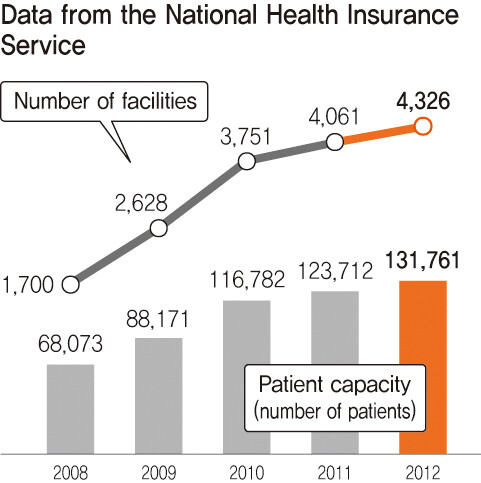hankyoreh
Links to other country sites 다른 나라 사이트 링크
[Special reportage- part 1B] Where are human rights for the elderly?</

■ Oppression of physical freedom and being talked down to
All of the doors that lead outside the nursing home are controlled by the staff. Even the emergency exits have electronic locks. The exits are controlled in this way as a means of preventing the disappearance of elderly people with dementia, but in practice could result in so-called illegal confinement.
The nursing home is located in a shopping area in front of an apartment complex. Once a patient is registered in this nursing home, it is hard for the patients to leave unless their family brings them out. A fire would likely cause many casualties. There was a case in Nagasaki, Japan in February where a nursing home for the elderly with dementia caught fire, causing four deaths and eight injuries. Something similar could happen in Korea.
Nobody wants to spend the rest of his or her life lying in bed. That is why the elderly people in the nursing homes try to keep standing up. There was even an elderly woman who tried to walk on her own and fell down, bruising her face. To these patients, the blue sky and clouds are only visible through the window. These regulations are actually for the convenience of the nursing homes rather than the well-being of the patients. The 2006 ‘Nursing home Protection of Human Rights and Safety Management Manual’ by the Ministry of Health and Welfare, had no regulations on patients being stuck indoors.
Violent language and action that crosses the line can be often observed in the nursing homes. It has become a custom for the nurses to ‘talk down’ to the elderly, using forms of Korean speech that are considered rude when addressing seniors. A physical therapist who was taking care of a woman with dementia who was unable to stretch her legs would yell, “You can’t hear me? Stretch your legs!” while pulling on the patient’s ear. In other cases a nurse would tap the head of a laid down patient for no apparent reason.
The condition of medical services also seems poor. The nursing home works with an internal medicine clinic that is located in the same shopping area for prescriptions, but the management of this system is sub par. They would ask me, despite being a volunteer, to administer the drugs. Lim Soon-mal (not her real name), 87, suffering from a severe case of dementia and bedsores, stays in bed all day. While it is vital for her to take medicine regularly, the nurses just directed me to pour water and the powdered medicine into the small bowl that contained food. Lim said, “It’s bitter” while throwing up the medicine. Most of the medicine would trickle down her body rather than entering her mouth.

There are other problems for the elderly who cannot express themselves. There are unimaginably unhygienic situations. On the first day of volunteering, the nurse asked me to help with “nail care” while handing me a pouch. The only precaution he said was to “not clip the nails to short”. Inside the pouch was a single nail clipper. When the socks of the elderly man in the first room were removed, it could be seen that he was suffering from a serious case of athlete’s foot. I was given a plastic glove only after I asked for one.
After finishing clipping the nails of the first patient, I asked, “Do you clip all the patients’ nails with this one clipper?” The nurse replied, “Yeah, it’s okay” with a disturbed facial expression. The condition of the nails of the other patients was also severe. Of all of the patients, it seemed at least 30% of them suffered from athlete’s foot, their nails and toenails thick like tree bark. Some of the elderly even had blood clots caused by injuries incurred during nail clipping. Even in these conditions, only one nail clipper was being used for all the patients. After the nail care was over, the nurse took the pouch and clipper and placed it inside the storage room. UV disinfectant or sterilizers were nowhere to been seen. These poor conditions could lead to the spread of infection.
Poor hygienic conditions could also be seen during the process of diaper changing. One nurse sprayed water while changing the diapers of an elderly man who had cerebral infarction. A sour smell emanated, which the nurse said was “diluted vinegar”. The vinegar was meant to clean the patients after their defecation. The hospital room was full of the mixed smell of vinegar and excrement. While changing the diapers with his practiced skill, the nurse said, “The diluted vinegar should disinfect the patients to some extent”.
On this matter, dermatologist Choi Hyung-woo, director at Wells Clinic, said, “There have been cases where burns were caused after using vinegar to clean the skin. The wounds then became infected, causing hematosepsis. Caution should be taken when using vinegar to treat the elderly or patients with chronic diseases.”

As South Korea becomes an aging society, it is only natural for there to be an increase in the incidence of Alzheimer’s and diseases associated with aging. In Korean society today, it would be hard for family members to take full responsibility for looking after the elderly and taking care of them when they are sick. In advanced economies, governments have quickly moved to take over this role in order to guarantee the welfare of the elderly.
South Korea is no exception. In 2008, it introduced a long-term care elderly care system as one of the social insurance systems, and since then the number of nursing homes for the elderly has increased rapidly.
However, the elderly people staying in the nursing home that was investigated for this report were not enjoying the right to live their final years with dignity while receiving the protection that their families cannot provide. Rather, they were trapped in a human rights loophole. During the investigation, a lack of sensitivity to human rights was observed, both among the elderly people who are in the hospital beds, and among the nursing home nurses who are abusing the elderly people’s rights.
The patients themselves were resigned to their situation. They felt that they couldn’t do anything since they were old and sick. Meanwhile, the entire nursing home was dominated by workers with a poor understanding of human rights. The workers neglected the elderly people’s rights on the assumption that the patients were barely aware and could not notice.
Are conditions like this unique to this nursing home? A nurse working at a large nursing home with 120 patients in Seoul said, “Because the job is difficult, it is easy to treat the elderly harshly with thoughts that these patients don’t have any cognitive ability. Even the elderly who do have cognitive ability endure this insensitive treatment because they think of themselves as patients. Although I also had difficulty in the beginning, I’ve become accustomed to it”.
Yang Bong-suk, head of the Korea Patients’ Welfare Center said, “Several times to the government I proposed making an index of the actual human rights conditions experienced by patients, but they weren’t accepted. A regular monitoring system must be established as soon as possible”. The government has never administered an actual survey on the human rights of elderly patients in nursing homes.
The case of Lee Mal-suk, who returned home after just two days at the nursing home, and various other things that took place at the home should lead us to question once more the basic legal framework stipulated in the elderly welfare law.
"The elderly are to be respected, since they are the ones who raised children and contributed to the development of their society and their nation, and they are to receive a guarantee of a decent and secure livelihood,” the law states.

Translated by Kim Kyung-min, Hankyoreh English intern
Please direct questions or comments to [english@hani.co.kr]
Editorial・opinion
![[Column] Park Geun-hye déjà vu in Yoon Suk-yeol [Column] Park Geun-hye déjà vu in Yoon Suk-yeol](https://flexible.img.hani.co.kr/flexible/normal/500/300/imgdb/original/2024/0424/651713945113788.jpg) [Column] Park Geun-hye déjà vu in Yoon Suk-yeol
[Column] Park Geun-hye déjà vu in Yoon Suk-yeol![[Editorial] New weight of N. Korea’s nuclear threats makes dialogue all the more urgent [Editorial] New weight of N. Korea’s nuclear threats makes dialogue all the more urgent](https://flexible.img.hani.co.kr/flexible/normal/500/300/imgdb/original/2024/0424/7317139454662664.jpg) [Editorial] New weight of N. Korea’s nuclear threats makes dialogue all the more urgent
[Editorial] New weight of N. Korea’s nuclear threats makes dialogue all the more urgent- [Guest essay] The real reason Korea’s new right wants to dub Rhee a founding father
- [Column] ‘Choson’: Is it time we start referring to N. Korea in its own terms?
- [Editorial] Japan’s rewriting of history with Korea has gone too far
- [Column] The president’s questionable capacity for dialogue
- [Column] Are chaebol firms just pizza pies for families to divvy up as they please?
- [Column] Has Korea, too, crossed the Rubicon on China?
- [Correspondent’s column] In Japan’s alliance with US, echoes of its past alliances with UK
- [Editorial] Does Yoon think the Korean public is wrong?
Most viewed articles
- 1‘We must say no’: Seoul defense chief on Korean, USFK involvement in hypothetical Taiwan crisis
- 2N. Korean delegation’s trip to Iran shows how Pyongyang is leveraging ties with Moscow
- 3‘Weddingflation’ breaks the bank for Korean couples-to-be
- 4Korea sees more deaths than births for 52nd consecutive month in February
- 5[Column] Park Geun-hye déjà vu in Yoon Suk-yeol
- 6Will NewJeans end up collateral damage in internal feud at K-pop juggernaut Hybe?
- 7[Column] Has Korea, too, crossed the Rubicon on China?
- 8Amnesty notes ‘erosion’ of freedom of expression in Korea in annual human rights report
- 9Samsung barricades office as unionized workers strike for better conditions
- 10[Column] The clock is ticking for Korea’s first lady